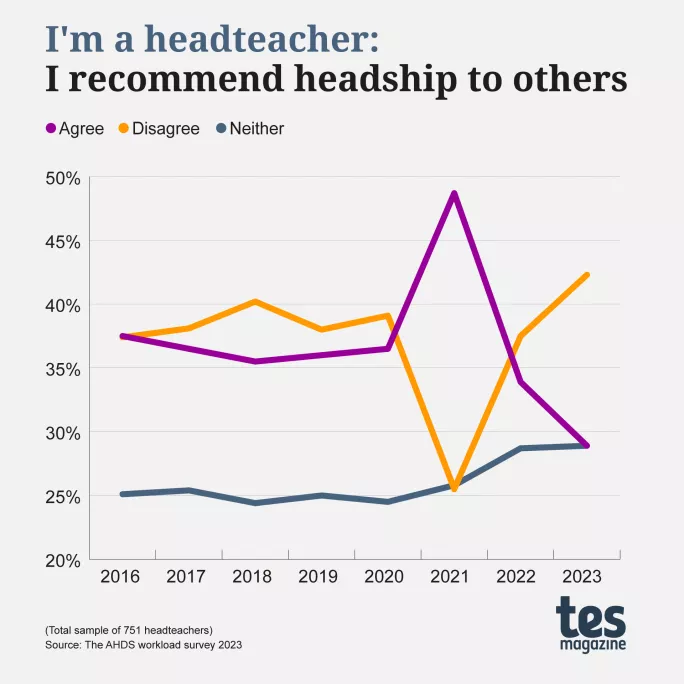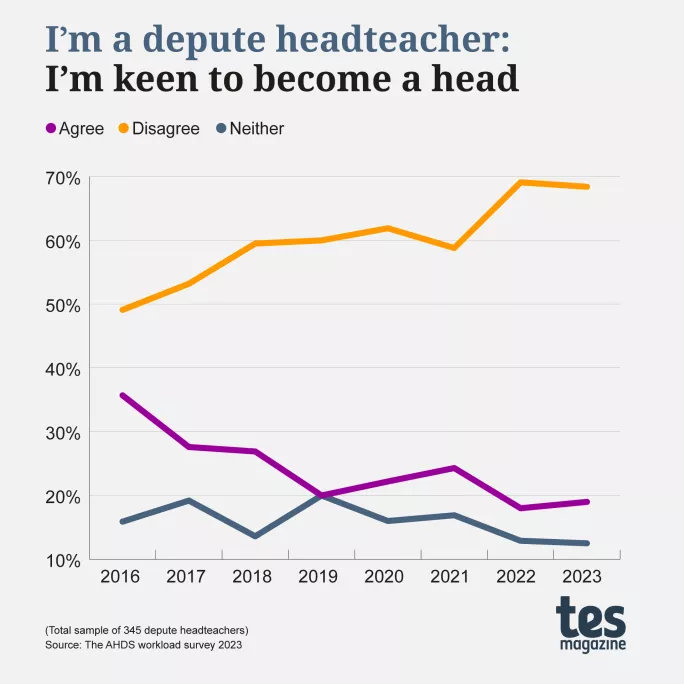Primary heads: ‘Burnout seems to be inevitable’

Less than a third of primary headteachers would recommend their job to others, according to new figures shared exclusively with Tes Scotland.
It is the lowest proportion since primary school leaders’ body the AHDS began surveying members in 2016 about workload and the desirability of headship. Then, 37.5 per cent of primary heads said they would recommend headship, but this year that dropped to 28.9 per cent.
The latest survey - which involved almost 1,300 Scottish school leaders, including over 700 heads - also found that just a fifth of promoted primary staff were keen to become headteachers (19 per cent of depute headteachers and 20.3 per cent of principal teachers).
Again, depute headteachers (DHTs) and principal teachers (PTs) were more positive about headship when the survey got underway in 2016 - at that time, over a third of DHTs and PTs were keen to become headteachers.
The exception came in 2021 with a rise in the proportion of PTs and DHTs aspiring to become heads, and also a rise in the proportion of heads saying they would recommend the role.


Greg Dempster, general secretary of the AHDS, says that context is required to understand the more positive attitudes to headship in 2021.
The survey is conducted in February and March each year. In 2021, pupils were just beginning to return to in-person learning after the second national Covid lockdown, beginning with P1-3 on 22 February.
Although school leaders were juggling home learning and face-to-face learning before all pupils returned in mid-March, Dempster says they felt they had “more autonomy”. Priorities were clear and - other than adhering to Covid guidelines - school leaders were “left to get on with it”.
Whatever the explanation, the positivity about headship did not last.
In 2022 there was “a big swing back in the other direction with [heads] less likely to recommend headship to others”, finds the AHDS analysis this year, which adds: “This negative position worsened markedly in 2023 returns.”
- Related: New figures spark warnings of primary head shortage
- Research: Heads’ qualification praised - but more time needed to do it
- News: How do Scottish headteacher salaries compare?
- Long read: The end of the primary head? A warning from Scotland
The analysis finds that 2023 comments from headteachers who would not recommend the job were, “if anything, starker than the ones from previous years”.
It adds: “Members commented on impossible workloads/expectations, little thanks or appreciation, reducing resources and the lack of a meaningful salary differential (from DHT to HT) to in any way compensate.”
And “many of the comments of those who recommended headship were not dissimilar to those who did not recommend it - only, they were accepting of the need to have the role take over their lives and appeared to see the opportunity to ‘make a difference’ as a balancing factor”.
One head who would recommend headship says that “anyone who is passionate about improving education for children would find value in the role” - with the caveat, “if they have a lot of energy and few family commitments”.
Another says: “I do recommend the job but am also honest about the workload and impact of the role on [my] own mental health and family time.”
Some 42.3 per cent of headteachers in this year’s survey felt unable to recommend the job. One comment reads: “The job is beyond stressful and it would be unfair of me to recommend it to others”; another that “burnout no longer seems to be a possibility but more an inevitable outcome”.
One head describes the responsibility of leading a school as “soul crushing” and would “not wish it on anyone.” Another cannot get through the day “without medication for headaches caused by stress”.
Even PTs and DHTs open to being a headteacher acknowledge it is “a massive responsibility” and see “very little financial incentive to move up”.
Those not interested in headship talk about seeing “the unrealistic demands made on [headteachers] and how it changes them”, as well as too much time spent “on paperwork and fighting fires” rather than with staff and pupils.
Into Headship qualification is a barrier
They also identify the mandatory Into Headship qualification as a barrier - one DHT says the course would be “too much with the DHT job and being a parent”.
Into Headship, a master’s-level qualification, has been mandatory in Scotland for new headteachers since August 2020.
Last week, Tes Scotland revealed that the average number of headteacher posts coming up every year was outstripping the number of staff with Into Headship, prompting concerns about a potential headteacher shortage.
There are also fears that too much pressure is being put on acting heads, who are often expected to complete the qualification while grappling with their first headship.
Dempster says promoted staff undertaking Into Headship need protected time to do so, and is calling on councils to provide it. He believes that time would also create opportunities for others to step up and get experience working in a promoted post, and in turn “feed that pipeline of interest in headship”.
A willingness to support CPD could also then make promotion more appealing to other staff in school.
However, Dempster says that workload needs to be tackled “for the sake of those [already] in the role” and for the “desirability of headship to increase” among other staff.
Headteacher workload, he says, is fuelled by years of budget cuts and subsequent reductions in promoted posts, support staff and local authority staff who support schools.
One headteacher says that the day-to-day responsibilities are “probably not what anyone expects” and that heads “often end up being the person covering for whoever isn’t at work, eg, supervising dinner hall, sweeping floors”.
Concern over support for pupils with ASN
“Inadequate support” for pupils with additional support needs (ASN) is the biggest concern for primary heads, says Dempster, and “to deliver the presumption of mainstreaming effectively...school leaders become the go-to for any incidents or things that escalate, because there is not the support staff there”.
Laurence Findlay is the director of education and children’s services at Aberdeenshire Council and also chair of the Scottish government’s headteacher recruitment and retention working group.
The group - re-established in early 2022 to explore how to make headship more attractive - has held focus-group discussions with heads, DHTs and PTs in a bid to understand the challenges of the role and what might be deterring promoted primary staff from headships.
The four key themes to emerge have been workload, pay, diversity, and support and development.
The annual report on diversity in Scottish teaching earlier this year revealed that fewer than 1 per cent of teachers in promoted posts identified as being from ethnic-minority backgrounds.
Findlay says the group’s findings will now go to the Scottish Education Council - described on the government’s website as “the key forum for oversight of improvement in education in Scotland” - which will decide on “next steps”.
In the meantime, he has written to the Scottish Negotiating Committee for Teachers to ascertain progress in reviewing the “job-sizing toolkit” used to determine the salaries in promoted posts.
An early draft of this letter - seen by Tes Scotland - says “the position of headteacher has become even less desirable in the recent years” because of “the current cost-of-living crisis and increasing workload”, and that “headteacher positions sometimes only see small pay increases in comparison to DHT positions due to job sizing”.
In the draft letter, Findlay also highlights that the job-sizing toolkit is not fit for purpose when it comes to headteachers with more than one school.
But Findlay says any significant cash injection - to improve headteacher salaries or the way primary schools are staffed - is unlikely in the current climate, and it is therefore “about using all the levers that we do have to their fullest effect”.
No one-size-fits-all for head recruitment
Findlay believes the job of primary headteacher could made more manageable by improved “cluster working” - schools collaborating more with each other and sharing expertise - as well as making better use of digital technology to reduce admin and paperwork. He cites the parentsportal service, which aims to improve communication between school and home as one example.
He also says education directors are working to streamline recruitment processes to improve consistency across authorities and make applying for promotion less onerous.
But he urges caution around hopes for one-size-fits-all solutions on headteacher recruitment: “I was asked by a headteacher here in Aberdeenshire, why does every primary school in Edinburgh have a business manager and we don’t?
“Well, the reality is that Edinburgh probably has a more efficient learning estate, where most schools are 400-500 children and they are not spending the £21 million a year on school transport that we have to spend.
“So, I think we need to be very careful about suggesting that there is just one approach because we are such a diverse country.”
Clearly, action is needed to stop the primary headteacher pipeline from drying up. But the issues are well known by now - it is a coherent plan for addressing them that is lacking.
You need a Tes subscription to read this article
Subscribe now to read this article and get other subscriber-only content:
- Unlimited access to all Tes magazine content
- Exclusive subscriber-only stories
- Award-winning email newsletters
Already a subscriber? Log in
You need a subscription to read this article
Subscribe now to read this article and get other subscriber-only content, including:
- Unlimited access to all Tes magazine content
- Exclusive subscriber-only stories
- Award-winning email newsletters
topics in this article



